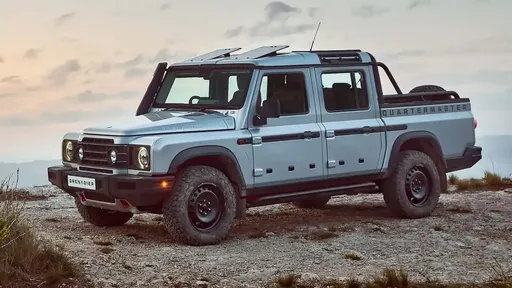Peugeot 208 vs Ineos Grenadier Pick-Up – Differences & prices compared
Compare performance, boot space, consumption and price in one view.
Find out now: which car is the better choice for you – Peugeot 208 or Ineos Grenadier Pick-Up?
The Peugeot 208 (Hatchback) comes with a Petrol, Electric or Petrol MHEV engine and Manuel or Automatic transmission. In comparison, the Ineos Grenadier Pick-Up (Pickup) features a Petrol or Diesel engine with Automatic transmission.
When it comes to boot capacity, the Peugeot 208 offers 352 L, while the Ineos Grenadier Pick-Up provides – depending on how much space you need. If you’re looking for more power, decide whether the 156 HP of the Peugeot 208 or the 286 HP of the Ineos Grenadier Pick-Up suits your needs better.
In terms of consumption, the values are 14.10 kWh4.50 L per 100 km for the Peugeot 208, and 10.90 L for the Ineos Grenadier Pick-Up.
Price-wise, the Peugeot 208 starts at 20200 £, while the Ineos Grenadier Pick-Up is available from 62300 £. Compare all the details and find out which model fits your lifestyle best!
Peugeot 208
The Peugeot 208 exudes a distinctive French charm, combining sleek lines with an assertive stance on the road. Inside, it offers a modern and sophisticated cabin, complete with intuitive technology and high-quality finishes to enhance the driving experience. Its agile handling and efficient performance make it a delightful choice for both city commuting and longer journeys.
details @ www.media.stellantis.com
@ www.media.stellantis.com
 @ www.media.stellantis.com
@ www.media.stellantis.com
 @ www.media.stellantis.com
@ www.media.stellantis.com
 @ www.media.stellantis.com
@ www.media.stellantis.com
Ineos Grenadier Pick-Up
The Ineos Grenadier Pick-Up embodies rugged durability, drawing inspiration from classic off-road vehicles while integrating modern engineering. Its design is tailored for both adventure and utility, offering ample space and functionality for diverse needs. This pick-up's robust capabilities are matched by its commitment to delivering a dependable and resilient driving experience across challenging terrains.
details @ media.ineosgrenadier.com
@ media.ineosgrenadier.com
 @ media.ineosgrenadier.com
@ media.ineosgrenadier.com

|

|
|
|
|
Costs and Consumption |
|
|---|---|
|
Price
20200 - 35100 £
|
Price
62300 - 70200 £
|
|
Consumption L/100km
4.5 - 5.2 L
|
Consumption L/100km
10.9 - 14.4 L
|
|
Consumption kWh/100km
14.1 - 15.4 kWh
|
Consumption kWh/100km
-
|
|
Electric Range
362 - 432 km
|
Electric Range
-
|
|
Battery Capacity
46 - 51 kWh
|
Battery Capacity
-
|
|
co2
0 - 117 g/km
|
co2
286 - 325 g/km
|
|
Fuel tank capacity
44 L
|
Fuel tank capacity
90 L
|
Dimensions and Body |
|
|---|---|
|
Body Type
Hatchback
|
Body Type
Pickup
|
|
Seats
5
|
Seats
5
|
|
Doors
5
|
Doors
4
|
|
Curb weight
1165 - 1530 kg
|
Curb weight
2665 - 2740 kg
|
|
Trunk capacity
309 - 352 L
|
Trunk capacity
-
|
|
Length
4055 mm
|
Length
5440 mm
|
|
Width
1745 mm
|
Width
1943 mm
|
|
Height
1430 mm
|
Height
2019 mm
|
|
Payload
380 - 430 kg
|
Payload
760 - 835 kg
|
Engine and Performance |
|
|---|---|
|
Engine Type
Petrol, Electric, Petrol MHEV
|
Engine Type
Petrol, Diesel
|
|
Transmission
Manuel, Automatic
|
Transmission
Automatic
|
|
Transmission Detail
Manual Gearbox, Dual-Clutch Automatic
|
Transmission Detail
Automatic Gearbox
|
|
Drive Type
Front-Wheel Drive
|
Drive Type
All-Wheel Drive
|
|
Power HP
101 - 156 HP
|
Power HP
249 - 286 HP
|
|
Acceleration 0-100km/h
8.3 - 10.9 s
|
Acceleration 0-100km/h
8.8 - 9.8 s
|
|
Max Speed
150 - 200 km/h
|
Max Speed
160 km/h
|
|
Torque
205 - 270 Nm
|
Torque
450 - 550 Nm
|
|
Number of Cylinders
3
|
Number of Cylinders
6
|
|
Power kW
74 - 115 kW
|
Power kW
183 - 210 kW
|
|
Engine capacity
1199 cm3
|
Engine capacity
2993 - 2998 cm3
|
General |
|
|---|---|
|
Model Year
2023 - 2025
|
Model Year
2023 - 2024
|
|
CO2 Efficiency Class
D, A, C
|
CO2 Efficiency Class
G
|
|
Brand
Peugeot
|
Brand
Ineos
|
Peugeot 208
A Glimpse into the Future: The New Peugeot 208
The Peugeot 208, with its sleek design and innovative features, continues to set benchmarks in the automotive industry. As a hatchback, it seamlessly blends style with practicality, offering the perfect solution for urban driving and long-distance travels alike. In this article, we delve into the technical details and innovations that distinguish the latest iterations of the Peugeot 208.
Engine Options: Efficiency Meets Performance
The Peugeot 208 provides an array of engine options catering to different driving preferences. Featuring both petrol Mild-Hybrid technology and full electric powertrains, it offers a versatile range designed to accommodate eco-conscious drivers as well as those who prioritise performance.
With power outputs ranging from 101 PS to 156 PS, and a torque span of 205 Nm to 270 Nm, these machines are meticulously engineered to provide thrilling yet efficient drives. The petrol versions utilise a three-cylinder 1199 cm³ engine, optimising fuel consumption between 4.7 and 5.4 L/100km, while the electric e-208 models boast an impressive range of up to 410 km on a single charge.
Advanced Transmission Systems
The Peugeot 208 models come equipped with an advanced automatic transmission system, employing either a dual-clutch automatic gearbox or a manual transmission, depending on the chosen variant. These systems guarantee smooth gear transitions, thus enhancing driving pleasure and overall efficiency.
Performance and Environmental Considerations
From a performance standpoint, the Peugeot 208 impresses with its ability to accelerate from 0 to 100 km/h in between 8.3 to 10.9 seconds, depending on the model chosen. This level of performance is complemented by a top speed ranging from 150 to 200 km/h, ensuring that the 208 is more than capable of holding its own on the motorway.
With environmental consciousness at the forefront, the vehicle's CO2 efficiency class ranges from A to D, further establishing the Peugeot 208 as a responsible option for modern drivers keen on reducing their carbon footprint.
Comfort and Practicality: A Class Act
The interior of the Peugeot 208 reflects its exterior's stylish flair. It comfortably seats five passengers and offers a boot capacity of 265 to 309 litres, accommodating both city commutes and weekend getaways. Advanced comfort features and a state-of-the-art infotainment system ensure that rides are as enjoyable for passengers as they are for the driver.
Cost Considerations
The Peugeot 208 manages to strike a remarkable balance between cost efficiency and luxury. With prices ranging from €22,950 to €40,825, there is a variant to suit most budgets while still providing a premium experience. Additionally, the monthly costs and costs per kilometre are kept in check, making it an economically sound choice in the long term.
Dimensions and Design: Compact yet Spacious
Measuring 4,055 mm in length, 1,745 mm in width, and 1,430 mm in height, the Peugeot 208 maintains a compact profile that is perfectly suited to tight urban environments. Despite its manageable size, it offers ample space inside, thanks in part to clever design and engineering.
Conclusion: A Future-Proof Choice
The Peugeot 208 is a testament to modern automotive innovation. Whether powered by traditional engines or fully electric powertrains, it consistently delivers on performance, efficiency, and style. The combination of cutting-edge technology and sustainable practices places the Peugeot 208 as a forward-thinking choice for drivers seeking a vehicle that epitomises the best of contemporary motoring.
Ineos Grenadier Pick-Up
The Ineos Grenadier Pick-Up: A Trailblazer in Rugged Versatility
The Ineos Grenadier Pick-Up is a vehicle that combines robust capability with modern innovation, presenting itself as an exceptional option for both off-road enthusiasts and those seeking a reliable working vehicle. With its distinct design and powerful performance metrics, this pick-up truly stands out in the market.
Power and Performance
Under the bonnet, the Ineos Grenadier Pick-Up boasts a choice of robust engines. Buyers can opt for either a 3.0-litre turbocharged petrol or diesel engine, with the petrol variant delivering an impressive 286 PS and the diesel offering 249 PS. Both versions utilise a smooth automatic transmission that channel power to an all-wheel-drive system, ensuring excellent traction and stability across diverse terrains.
Innovative Engineering
The engineering ingenuity of the Ineos Grenadier is evident in its remarkable torque figures, ranging from 450 Nm to 550 Nm, providing the necessary force for challenging off-road expeditions. Furthermore, with a towing capacity that is substantially supported by its hefty frame and chassis, drivers can confidently tackle heavy loads.
Environmental and Economic Considerations
Despite its powerful performance, the Ineos Grenadier remains mindful of environmental responsibilities. The pick-up achieves fuel consumption rates of 10.9 L/100km for the diesel variant and 14.4 L/100km for the petrol version. However, it's important to note that CO2 emissions are correspondingly high, reflecting the strength and capacity of this vehicle. The CO2 efficiency is categorized within class G, emphasizing the balance between power and ecological impact.
Interior and Comfort
Inside, the Grenadier Pick-Up offers a blend of practicality and comfort. It can accommodate up to five passengers, with seating layouts that are designed to maximize comfort on long journeys. With a spacious cabin and ample storage options, it maintains functionality without sacrificing passenger comfort.
Dimensions and Practicality
Measuring 5440 mm in length, 1943 mm in width, and 2019 mm in height, the Ineos Grenadier Pick-Up is well-proportioned for a combination of city driving and off-road adventures. Additionally, the pick-up features a considerable load capacity, accommodating between 760 kg and 835 kg, making it suitable for commercial and recreational use.
Safety and Technology
In terms of technology, the Ineos Grenadier is grounded in modern safety features to ensure driver and passenger security. Advanced systems are integrated to assist in both everyday driving and more demanding conditions, further enhancing the driving experience.
Final Thoughts
The Ineos Grenadier Pick-Up represents a fine balance of power, precision, and practicality. Its robust design, combined with cutting-edge engineering, makes it an attractive proposition for those in search of a vehicle that can handle tough jobs while providing comfort and innovation.
The prices and data displayed are estimates based on German list prices and may vary by country. This information is not legally binding.
